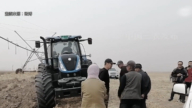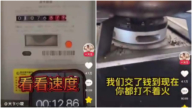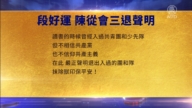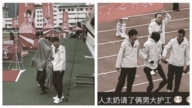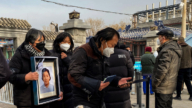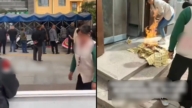【新唐人2013年02月02日訊】日前中共中央發佈的「一號文件」,聲稱連續第十年聚焦解決「三農」問題,並說,中共始終把解決好「農業、農村、農民」問題當作重中之重。那麼,為甚麼重中之重的問題連續十年解決不了?需要多少年才能解決?花十年還解決不了一個重中之重問題,中共還能解決甚麼問題?怎樣才能解決中國的問題?讓我們來看看。
所謂「中央一號文件」原指中共中央每年發佈的第一份文件。現在已經成為中共中央重視農村問題的專有名詞。中共中央在1982年至1986年連續五年,發佈以農業、農村和農民為主題的「中央一號文件」,文件針對農村改革和農業發展作出所謂具體部署。
日前中共中央、國務院印發了《中共中央、國務院關於加快發展現代農業,進一步增強農村發展活力的若干意見》,這是中共中央一號文件連續第十年聚焦「三農」問題,文件中強調把解決好農業問題作為重中之重,把城鄉發展一體化作為解決「三農」問題的根本途徑。
中國公民監政會發起人 郭永豐:「在這個體制下,它主要是維護當權者的利益,大多數老百姓的根本問題它是不會解決的,光是口頭上說重中之重,實際上沒有行動,唱一些假大空的空話而已,他解決不了的。」
「一號文件」還列舉了「人多、地少、水缺」的矛盾加劇,農村勞動力大量流動,農戶兼業化、村莊空心化、人口老齡化等一系列問題。
前大陸歷史學教授劉因全:「三農問題一直解決不了,根本的原因是這種政治體製造成的,是官員的腐敗造成的,根本上說,還是要解決中共一黨專制問題,強加給農民的一些枷鎖才行,比如說取消農民的戶口制度,允許農民自由的移動,土地私有化,買土地、賣土地都完全推到市場上去,而不是想現在這樣統一由政府管理。」
「一號文件」還強調,要促進農村工業化、信息化、城鎮化、農業現代化等同步發展,著力強化現代農業基礎支撐。有分析認為,這些具體意見將成為習、李執政思路,尤其是李克強,早已懷揣消滅農民,企圖實現農村城鎮化的夙願。
郭永豐:「城鎮化未必是最好的選項,現在的社會很多人在城鎮,他也夢想農村,農村的環境好,多清淨,多悠閒,空氣多清爽,城市的噪音污染多嚴重,有很多人還是希望到鄉村去,現在這個社會農業依然是根本,如果沒有農業,這個社會也崩潰了,也完蛋了。有些做法是獨裁者個人的意志,非常片面淺薄的做法。」
劉因全指出,在過去的農村城鎮化過程中,不但沒有給農民帶來實惠,相反,農民成了被再次盤剝的對像,在強拆的過程中,產生了大量住無居所的新生流浪群。
劉因全:「相反,農民的土地沒有了,因為農民的土地被強徵走了,農民成了無地的人口,而且農民按照目前的政策,又不能到城裡去,到城裡去又是三流公民,不能正式買房子,不能正常上學,不能正常就業,孩子上學還要交贊助費,沒有正常的保險,而且農民在農村也不能正常生活,他沒有土地了,這樣就造成了這群貧民階層流浪失所。」
郭永豐認為,只有進行政治體制改革,廢除一黨專政,讓真正的人才競爭上崗、服務社會,才能解決中國各個方面的問題。
採訪編輯/劉惠 後製/鍾元
CCP’s 10th Consecutive Year ‘Top Priority’
Recently, the central Chinese Communist Party (CCP)
issued No.1 Document (the first policy document for 2013.)
It claims CCP spent 10 years focusing on “three rural”
issues: “agriculture, rural areas and farmers.”
In addition, it said that the CCP considered
the three issues a top priority.
However, why the top priority issues couldn’t be solved in
a whole decade? How long can it take to solve three issues?
If CCP spent 10 years on a ‘top priority’ issue, yet nothing
changed, is CCP capable of solving China’s problems?
No.1 Document refers to the first document
issued at the beginning of each year.
It becomes CCP’s tradition
to emphasize the rural issues.
From 1982 to 1986, within five years, the CCP issued five
No.1 documents on “agriculture, rural areas and farmers.”
The documents specifically designed the so-called
“plans” toward rural reform and agricultural development.
CCP published its No.1 document, “The Central CCP and
The State Council Opinions On Accelerating Modern Agricultural Industry and Rural Areas’ Development.
This is the 10th consecutive year that the CCP focuses
on solving the three rural issues in its No.1 document.
The document emphasizes those agricultural issues
have to be given a top priority.
And that integrating urban and rural development
is the fundamental way to solve the “three rural” issues.
Guo Yongfeng, founder of China Citizen Watchdog: “Under
such a system, CCP mainly focuses on its own interests.
It can’t solve most citizens’ fundamental problems.
They promised on the surface, but there is no real action.
They talk empty words, but can’t solve problems.”
No.1 document lists intensified conflicts between increased
population and lessened land, as well as the water shortage.
It talks about large-scale farmer migrant workers outflow,
part-time farming, villages hollowing, population aging, etc..
Liu Yingquan, former History Professor, Mainland China:
“Rural issues haven’t been solved, the fundamental cause is the system and the corrupt officials.
Basically, it needs to solve the one party authoritarian issues,
and the farmers’ burden.
For example, to remove farmer’s household registration
system, allowing farmers to move freely,
and to allow privatization of land, buying or selling land
on the market without the control of the government.”
No.1 document also imposes rural industrialization,
information technology, urbanization and agricultural modernization’s developing simultaneously.
Or to strengthen the basic support
for the modern agricultural industry.
Analysts believe, the detailed opinions in the document will
be Xi Jinping and Li Keqiang’s policy-making references.
Particularly Li Keqiang, he has already attempted to get rid
of the rural and urban gap, dreaming for rural urbanization.
Guo Yongfeng: “Urbanization maybe isn’t the best choice.
Many people in urban areas dream to live in the countryside,
in a good, quiet and relax environment, with a fresh air.
In the cities is too noisy, with heavy pollution,
thus many people want to move to the countryside.
In today’s society, the countryside is the base,
without agriculture, this society will collapse.
Some measures are dictator’s individual will,
they are very superficial approaches.”
Liu stressed that the process of rural urbanization in the past,
didn’t do farmers a favor, on the contrary, farmers become target of interests’ gain.
The process of demolitions resulted
in people becoming homeless on a large-scale.
Liu Yingquan: “On the contrary, farmers lost their lands.
Their farmlands are being seized. They became homeless.
In addition, the current policy doesn’t allow farmers to move
to the cities. If they do, they become the third-class citizens.
They can’t buy a house, can’t go to school, or find jobs.
If their child goes to school, they need to pay donation fees. They don’t have standard insurance either.
Thus, farmers can’t live a normal life in the countryside
without a land anymore, so they end up wondering around.”
Guo believes, only by pushing forward the political reform
and disintegrating the one-party dictatorship,
can the real talents obtain their jobs through competition,
serve the society, and China’s various problems be solved.


